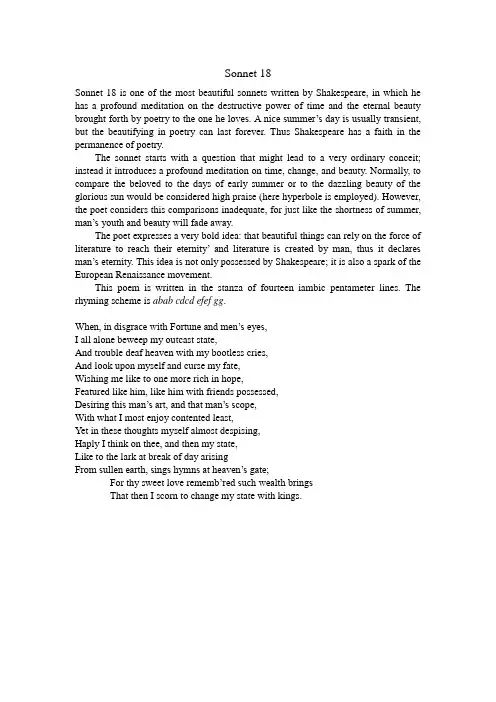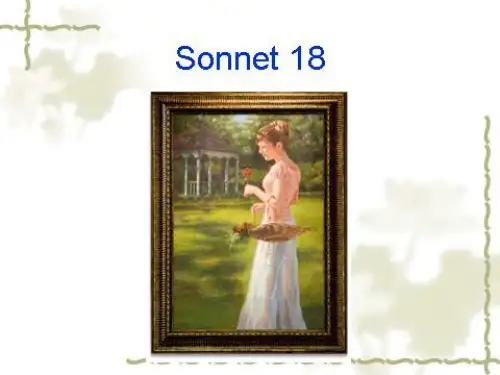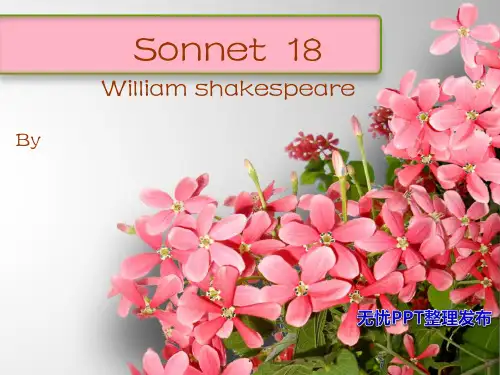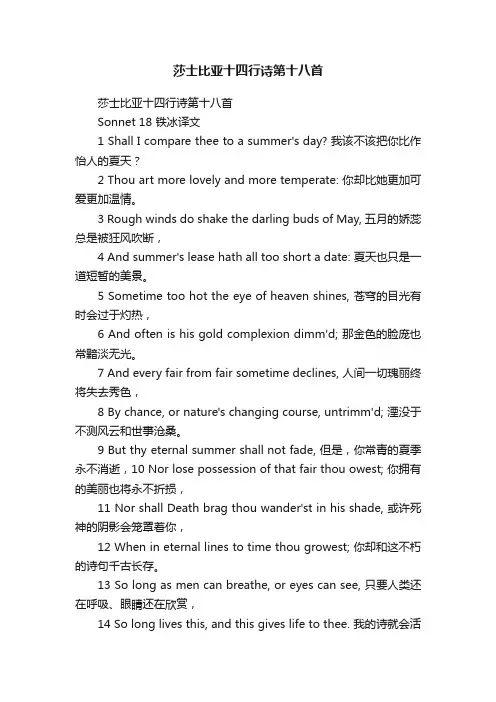莎士比亚Sonnet 18 (for students) 华南师范大学课件
- 格式:ppt
- 大小:369.50 KB
- 文档页数:16

Sonnet 18Sonnet 18 is one of the most beautiful sonnets written by Shakespeare, in which he has a profound meditation on the destructive power of time and the eternal beauty brought forth by poetry to the one he loves. A nice summer’s day is usually trans ient, but the beautifying in poetry can last forever. Thus Shakespeare has a faith in the permanence of poetry.The sonnet starts with a question that might lead to a very ordinary conceit; instead it introduces a profound meditation on time, change, and beauty. Normally, to compare the beloved to the days of early summer or to the dazzling beauty of the glorious sun would be considered high praise (here hyperbole is employed). However, the poet considers this comparisons inadequate, for just like the shortness of summer, man’s youth and beauty will fade away.The poet expresses a very bold idea: that beautiful things can rely on the force of literature to reach their eternity’ and literature is created by man, thus it declares man’s eternity. This idea is n ot only possessed by Shakespeare; it is also a spark of the European Renaissance movement.This poem is written in the stanza of fourteen iambic pentameter lines. The rhyming scheme is abab cdcd efef gg.When, in disgrace with Fortune and men’s eyes,I all alone beweep my outcast state,And trouble deaf heaven with my bootless cries,And look upon myself and curse my fate,Wishing me like to one more rich in hope,Featured like him, like him with friends possessed,Desiring this man’s art, and that man’s s cope,With what I most enjoy contented least,Yet in these thoughts myself almost despising,Haply I think on thee, and then my state,Like to the lark at break of day arisingFrom sullen earth, sings hymns at heaven’s gate;For thy sweet love remem b’red such wealth bringsThat then I scorn to change my state with kings.。






莎士比亚十四行诗第十八首莎士比亚十四行诗第十八首Sonnet 18 铁冰译文1 Shall I compare thee to a summer's day? 我该不该把你比作怡人的夏天?2 Thou art more lovely and more temperate: 你却比她更加可爱更加温情。
3 Rough winds do shake the darling buds of May, 五月的娇蕊总是被狂风吹断,4 And summer's lease hath all too short a date: 夏天也只是一道短暂的美景。
5 Sometime too hot the eye of heaven shines, 苍穹的目光有时会过于灼热,6 And often is his gold complexion dimm'd; 那金色的脸庞也常黯淡无光。
7 And every fair from fair sometime declines, 人间一切瑰丽终将失去秀色,8 By chance, or nature's changing course, untrimm'd; 湮没于不测风云和世事沧桑。
9 But thy eternal summer shall not fade, 但是,你常青的夏季永不消逝,10 Nor lose possession of that fair thou owest; 你拥有的美丽也将永不折损,11 Nor shall Death brag thou wander'st in his shade, 或许死神的阴影会笼罩着你,12 When in eternal lines to time thou growest; 你却和这不朽的诗句千古长存。
13 So long as men can breathe, or eyes can see, 只要人类还在呼吸、眼睛还在欣赏,14 So long lives this, and this gives life to thee. 我的诗就会活着,令你生命绽放。




Shakespeare - Sonnet 18 This sonnet is by far one of the most interesting poems in the book. Of Shakespeare's sonnets in the text, this is one of the most moving lyric poems that I have ever read. There is great use of imagery within the sonnet. This is not to say that the rest of the poems in the book were not good, but this to me was the best, most interesting, and most beautiful of them. It is mainly due to the simplicity and loveliness of the poem, praise of the beloved woman that it has guaranteed its place in my mind, and heart.The speaker of the poem opens with a question that is addressed to the beloved, "Shall I compare thee to a summer's day?" This question is comparing her to the summer time of the year. It is during this time when the flowers are blooming, trees are full of leaves, the weather is warm, and it is generally thought of as an enjoyable time during the year. The following eleven lines in the poem are also dedicated to similar comparisons between the beloved and summer days. In lines 2 and 3, the speaker explains what mainly separates the young woman from the summer's day: she is "more lovely and more temperate." (Line 2) Summer's days tend toward extremes: they are sometimes shaken by "rough winds" (line3) which happens and is not always as welcoming as the woman. However in line 4, the speaker gives the feeling again that the summer months are often to short by saying, "And summer, lease hath too short a date." In the summer days, the sun, "the eye of heaven" (line 5), often shines "too hot," or too dim, "his gold complexion dimmed" (line 6), that is there are many hot days during the summer but soon the sun begins to set earlier at night because autumn is approaching. Summer is moving along too quickly for the speaker, its time here needs to be longer, and it also means that the chilling of autumn is coming upon us because the flowers will soon be withering, as "every fair from fair sometime declines." (Line 7) The final portion of the sonnet tells how the beloved differs from the summer in various respects. Her beauty will be one that lasts forever, "Thy eternal summer shall not fade." (Line 9), and never end or die. In the couplet at the bottom, the speaker explains how that the beloved's beauty will accomplish this everlasting life unlike a summer. And it is because her beauty is kept alive in this poem, which will last forever. It will live "as long as men can breathe or eyes can see." (Line 13)On the surface, the poem is on the surface simply a statement of praise about the beauty of the beloved woman and perhaps summer to the speaker is sometimes too unpleasant with the extremes of windiness and heat that go along with it. However, the beloved in the poem is always mild and temperate by her nature and nothing at all like the summer. It is incidentally brought to life as being described as the "eye of heaven" with its "gold complexion". The imagery throughout the sonnet is simple and attainable to the reader, which is a key factor in understanding the poem. Then the speaker begins to describe the summer again with the "darling buds of May" giving way to the " summer lease", springtime moving into the warmth of the summer. The speaker then starts to promise to talk about this beloved, that is so great and awing that she is to live forever in this sonnet. The beloved is so great that the speaker will even go as far as to say that, "So long as men breathe, or eyes can see," the woman will live. The language is almost too simple when comparing it to the rest of Shakespeare's sonnets; it is not heavy with alliteration or verse, and nearly every line is its own self-contained clause, almost every line ends with some punctuation that effects a pause. But it is this that makes Sonnet18 stand out for the rest in the book. It is much more attainable to understand and it allows for the reader to fully understand how great this beloved truly is because she may live forever in it. An important theme of the sonnet, as it is an important theme throughout much of the poetry in general, is the power of the speaker's poem to defy time and last forever. And so by doing this it is then carrying the beauty of the beloved down to future generations and eventually for al of eternity. The beloved's "eternal summer" shall not fade precisely because it is embodied in the sonnet: "So long as men can breathe or eyes can see," (line 13) the speaker writes in the couplet, "So long lives this, and this gives life to thee."(Line 14) With this the speaker is able to accomplish what many have done in poetry and that is to give the gift of an eternal life to someone that they believe is special and outshines everyone else around them. Perhaps it is because of a physical beauty that the speaker see, but I believe that it is more because of the internal beauty as seen in line 2, "Thou art more lovely and more temperate", that the beloved is deserving to live on forever.